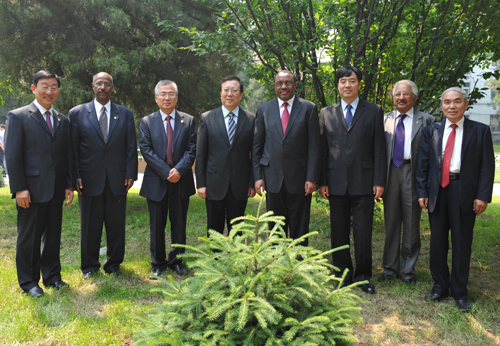Less aid, more investment
Capacity building is another challenge facing the continent, according to Seyoum Mesfin, Ethiopian Ambassador to China. "Africa's human resources have to be transformed into human capital, because we have to advance in education, science and technology in order to be able to fully develop and utilize the natural resources to ensure the development of the continent," he said.
Tantamount to capacity building and integration is the need to shift from an Africa that relies on foreign aid to a continent that attracts foreign investment, according to Dessalegn. China is a major investor in Africa. Take Ethiopia for example, over 400 Chinese companies have set up businesses in that country, and China has also set up a special economic zone there.
Apart from the traditional areas of investment such as in the extractive sector, Dessalegn suggested that Chinese investment in Africa can be expanded to other sectors, such as manufacturing, because these sectors create more jobs and ensure skills and technology transfer.
 |
|
Hailemariam Dessalegn (fourth from the right) plants a spruce on BFSU's campus on June 14, symbolizing the long-lasting friendship between the two countries (GUO WEI) |
During Dessalegn's visit, he also attended the unveiling of BFSU's Research Center for African Languages and Cultures. He believes language learning and cultural exchanges play a vital role in enhancing people-to-people relations between China and Africa.
Among the 58 foreign languages taught at BFSU, three are African languages: Hausa, Swahili and Zulu, while the widely used languages in Africa such as English, French, Arabic and Portuguese are also taught in the university. Amharic, Ethiopia's working language, will be taught from September, according to Professor Han Zhen, BFSU's President.
BFSU also plans to cooperate with Ethiopian universities in language teaching and cultural studies, students and faculty exchanges, as well as inviting Amharic language experts to teach at the university.
"Africa, with nearly 1 billion population, China, with 1.3 billion population, we keep the balance of the globe." said Dessalegn. "So if you enhance the partnership between Africa and China in such a way that our two peoples can better understand each other in terms of culture and language, that means we can lead the world in the political and economic way."
During his meeting with Dessalegn, Chinese Premier Li Keqiang said that China is also willing to enhance cultural exchanges with African countries, including Ethiopia, deepening cooperation in education, culture and tourism.
Looking into the future cooperation, Dessalegn believes China-Africa new type of strategic partnership is not only key for mutual progress but is also critical for fairness and the rule of law in the current international order.
"Africa and China should harmonize their efforts in areas of UN reform, climate change and sensitive peace and security issues throughout Africa and beyond in the interest of finding lasting solutions to our common problems and challenges," said Dessalegn.
Premier Li also called for more communication on international and regional issues of importance. "China will continue to support Africa's peace, development and integration, help the continent's countries increase their development capabilities and make the China-Africa cooperation benefit the two peoples," he said.